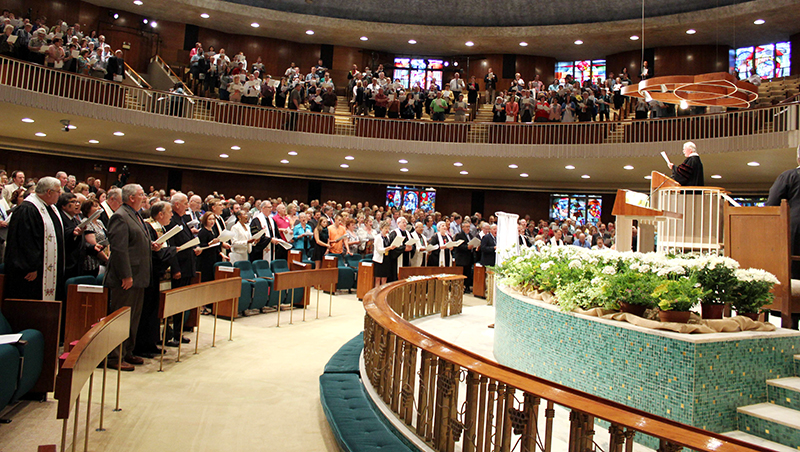The business session of the Oklahoma Annual Conference of the United Methodist Church included discussion of five proposed amendments to the denomination’s 20-page constitution, which were initially approved by the 2016 UMC General Conference. In order for any of these revisions to be incorporated into the UMC Book of Discipline (of which the Constitution is the foundational section), two-thirds of the aggregate individual delegates from all of the UMC annual conferences around the world must vote for the amendment in question. Amendments I and II are related to diversity and inclusiveness within the UMC, but also include some wording that are “red flags” for many in the Oklahoma Annual Conference. Debates over the first two proposed amendments featured theological and spiritual controversies regarding gender, sexism, and the inclusivity of the UMC.
Amendment I would add an entire new paragraph to the UMC Constitution:
“As the Holy Scripture reveals, both men and women are made in the image of God and, therefore, men and women are of equal value in the eyes of God. The United Methodist Church recognizes it is contrary to Scripture and to logic to say that God is male or female, as maleness and femaleness are characteristics of human bodies and cultures, not characteristics of the divine. The United Methodist Church acknowledges the long history of discrimination against women and girls. The United Methodist Church shall confront and seek to eliminate discrimination against women and girls, whether in organizations or in individuals, in every facet of its life and in society at large. The United Methodist Church shall work collaboratively with others to address concerns that threaten the cause of women’s and girl’s equality and well-being.”
Rev. Anna Marie George argued for this amendment by anecdotally describing her alleged personal experience of sexism within the UMC. There were no other speeches supporting or opposing this amendment.
Amendment II was also debated in the Oklahoma Annual Conference would, among other things, remove the qualifier “without regard to race, color, national origin, status, or economic condition” from the Constitution to say “All persons shall be eligible to attend its worship services, participate in its programs, receive the sacraments, upon baptism be admitted as baptized members and upon taking vows declaring the Christian faith, become professing members in any local church in the connection.” Further, it would add “nor shall any member be denied access to an equal place in the life, worship, and governance of the Church because of race, color, gender, national origin, ability, age, marital status, or economic condition.” It would therefore insert broad, constitutional protections to the new categories of ability, age, gender, or marital status, without making clear what exactly is meant of the latter two categories. These revisions would result in the following paragraph:
“The United Methodist Church is part of the church universal, which is one Body in Christ. The United Methodist Church acknowledges that all persons are of sacred worth. All persons shall be eligible to attend its worship services, participate in its programs, receive the sacraments, upon baptism be admitted as baptized members and upon taking vows declaring the Christian faith, become professing members in any local church in the connection. In the United Methodist church, no conference or other organizational unit of the Church shall be structured so as to exclude any member or any constituent body of the Church because of race, color, national origin, ability, or economic condition, nor shall any member be denied access to an equal place in the life, worship, and governance of the Church because of race, color, gender, national origin, ability, age, marital status, or economic condition.”
Three Oklahoma Annual Conference members argued for this amendment, and three opposed it. Dr. Elaine Robinson, whose comments were similar to the two other speakers in favor of this change, stated that inserting these blanket constitutional protections would somehow expand the status of women around the globe. She referenced the alleged exclusion of many women from participating in non-Western churches to justify her belief. Laywoman Cara Nicklas spoke against this bill, specifically because of the meaning of “gender.” While she passionately welcomed gender-neutral and gender-fluid individuals into worship services, this expansive theology could possibly function as a back-door approach to entitle transgender activists or people living in clear, unrepentant sexual sin.
All advocates on both sides of this amendment have passionate and seemingly sincere arguments that are incredibly personal. The Oklahoma Annual Conference members’ votes will matter significantly in the aggregate global popular vote of the UMC because the state is one of the largest-membership annual conferences. For further reference, United Methodist Renewal and Reform Coalition, of which IRD’s UMAction program is a member, unpacks all five proposals in considerable detail. Regardless, as annual conferences continue to convene throughout this year, prayer for discernment and wisdom of the UMC annual conference members is crucial.





Comment by James W. Lung on July 8, 2017 at 2:37 pm
Thank you for covering this very important issue. Just curious, do you know the final votes on the first two amendments in his annual conference?
Comment by Kelly on July 9, 2017 at 8:09 pm
Desert Southwest Conference is pushing all of this, when it hasn’t even passed, or sure the voting on it was even legal, does the national level plan to do anything???